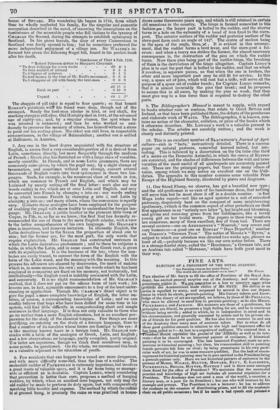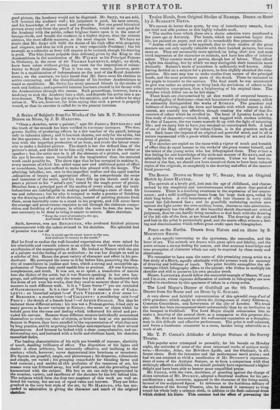FINE ARTS.
ELECTION OF A PRESIDENT OF THE ROYAL ACADEMY. "See Painting crowns her sister Poesy ! The world are all astonished—so is SHE." The Times. THE election of Mr. SHEE IO fill the office of President of the Royal Aca- demy, has excited general surprise out of the Academy, and some disap- k pointment w' in it, lir_t_stsoinewhat at a loss to eoticeiyevhat groun s the Academicians made choice of mi.. Sik"ra His ability as an artist is equalled by many, and surpassed by several in that one depart- ment in which he excels, portrait-painting. His literary talents and know- ledge of the theory of art are equalled, we believe, by those of Mr.PlItLLirs, who must be allowed to excel him in portrait-painting ; as do also Messrs. PICKERSGILL and JACKSON. His manners are those of a gentleman, his principles are liberal, he possesses a high feeling for art, and he is courteous without being servile ; added to which, he is independent in mind and in his circumstances, and generally esteemed by artists and by his private cir- cle of friends for his good qualities. He has also fewer enemies in and out of the Academy than many men of eminent talent. But to what do all these good qualities amount in relation to the high and important office he has be.e.n4alled to P— At best to a negative of unfitness. We contend that a resident reprabift-the Onistrof tliraadeliiy as well as its inte- rest,s--that he should be an historical painter of eminence, if historical painting is to be encouraged. The late lamented President made no pre- tensions M historical painting ; but then, his transcendent skill in painting female portraits left him no rival: by being preeminent in his own parti- cular walk of art, he was in some measure qualified. But the lack of encou- ragement forhistorical painting may be in part ascribed to the President being a portrait-painter only. Have we not historical painters of eminence in the persons of Messrs. WILKIE, HILTON, HOWARD, Err 1- E. LANDSEER, PICKEUSGILL, BRIGGS, HATTER HAYDON ? and is there DORS amongst them fitted for the office of President? We maintain that the successful practice and knowledge of high art includes all essential requisites for a' President. The Academy does not need a man of -the world, a courtier, a literary man, or a poet for its President ; but one who will instruct by his example and precept. The President is not a lecturer: he has to address the students on the occasion of distributing prizes' and to fill the academic chair public occasions; hat if he made a bad speech and painsed a good pictitre, the Academy would not he disgraced. Mr. SnEv, we are told, will instruet the students well ; his judgment is good, his taste correct, and his knowledge of art sound and extensive. But one grand historical picture every year from the pencil of its President, would do mere good for the Academy with the public, reflect brighter lustre upon it in, the eyes of foreign rivals, and benefit the students in a higher degree, than the neatest address, the most affable manners, or the moat elegant bow. We have no doubt that Mr. Stas will fulfil the duties of Ills high office with propriety and elegance, and that he will prove a very respectable President ; but his example as a colourist at least will require to be resisted, though his drawing is good. The hint (more palpable than delicate) given by the sing o the Acadenaicians in the nomination of M. WILKIE as his Principal Painter in Ordinary, in the room of Sir THOMAS LAWRENCE, might, we think, have been taken without giving any room for the imputation of subser- viency to Royal dictation. That it was not, we cannot, however, attri- bute to a manifestation: of independence on the part of the Royal Academi- cians; on the contrary, we have heard that Mr. Suez owes his election to active canvassing, and the disinclinations of his brother Academicians to stand as candidates. Mr. Sun has many peracuial friends in the circles of rank and fashion; and a powerful interest has been created in his favour with the Academicians through this means. Such proceedings however, have a tendency to sink the Academy into a club, anddegrade the artist into a pa- tron-hunter. The Sing has yet to give hie sanction, and we believe he may refuse it. We are, however, far from saying that such a power is properly vested, or that its exercise is called, for in the present instance,



















 Previous page
Previous page